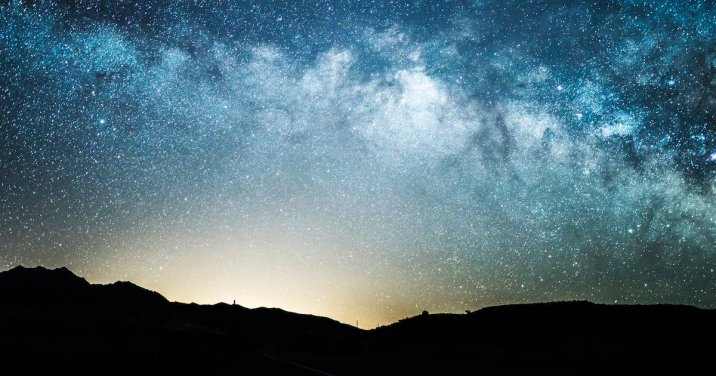As finite beings in a finite universe, it’s almost impossible for us to imagine what God was doing before time and matter as we know it was created. Was God alone? Was he adrift in a vast nothingness? Does the Bible give us any indication what life was like before the universe existed?
These are some of the questions that Dr. Michael S. Heiser (Ph.D. in Hebrew Bible and Semitic Languages at the University of Wisconsin-Madison) answers in his provocative and enlightening book The Unseen Realm: Recovering the Supernatural Worldview of the Bible.
The following post is adapted from The Unseen Realm.
Who are the sons of God?
Children often ask, “What was there before God made the world?” The answer most adults would give is that God was there. That’s true, but incomplete. God had company, and I’m not talking about the other members of the Trinity.
The biblical answer is that the heavenly host was with God before creation. In fact, they witnessed it. What God says to Job in Job 38:4–7 is clear on that point:
“Where were you at my laying the foundation of the earth?
Tell me, if you possess understanding.
Who determined its measurement? Yes, you do know.
Or who stretched the measuring line upon it?
On what were its bases sunk?
Or who laid its cornerstone,
when the morning stars were singing together
and all the sons of God shouted for joy?
When God laid the foundations of the earth, the “sons of God” were there, shouting for joy. But who are the sons of God? Obviously, they aren’t humans. This is before the creation of the world. We might think of them as angels, but that wouldn’t be quite correct.
The holy host: God’s morning stars
The unseen world has a hierarchy, something reflected in such terms as archangel versus angel. That hierarchy is sometimes difficult for us to discern in the Old Testament, since we aren’t accustomed to viewing the unseen world like a dynastic household (more on that following), as an Israelite would have processed certain terms used to describe the hierarchy. In the ancient Semitic world, sons of God (Hebrew: beney elohim) is a phrase used to identify divine beings with higher-level responsibilities or jurisdictions. The term angel (Hebrew: malʾak) describes an important but still lesser task: delivering messages.
In Job 38, the sons of God are referred to as “morning stars.” That same description is found outside the Bible in ancient texts from the biblical world. Ancient people thought the stars were living entities. Their reasoning was simple: Many stars moved. That was a sign of life to the ancient mind. Stars were the shining glory of living beings.
The stars also inhabited the divine realm—literally, in the sense that they existed off the earth. The ancients believed that divine beings lived far away from humans, in remote places where human habitation wasn’t possible.
The most remote place of all was the sky, the heavens.
Morning stars are the stars one sees over the horizon just before the sun appears in the morning. They signal new life—a new day. The label works. It conveys the right thought. The original morning stars, the sons of God, saw the beginning of life as we know it—the creation of earth.
God’s divine family
Right from the start, then, God has company—other divine beings, the sons of God. Most discussions of what’s around before creation omit the members of the heavenly host. That’s unfortunate, because God and the sons of God, the divine family, are the first pieces of the mosaic.
We’ve barely made it to creation so far, and already we’ve uncovered some important truths from Scripture that have the potential to affect our theology in simple but profound ways. Their importance, if it isn’t clear yet, becomes quickly apparent:
- The sons of God are divine, not human. The sons of God witnessed creation long before there were people. They are intelligent nonhuman beings. The reference to the sons of God as stars also makes it clear that they are divine. While the language is metaphorical, it is also more than metaphorical.
- The label “sons” is a familial term—and that’s neither coincidental nor inconsequential. God has an unseen family—in fact, it’s his original family. The logic is the same as that behind Paul’s words in Acts at Mars Hill (the Areopagus) that all humans are indeed God’s offspring (Acts 17:28). God has created a host of nonhuman divine beings whose domain is (to human eyes) an unseen realm. And because he created them, he claims them as his sons, in the same way you claim your children as your sons and daughters because you played a part in their creation.
While it’s clear that the sons of God were with God before creation, there’s a lot about them that isn’t clear. Who are they? What did they do? They’re divine, but what does that really mean? How should we think of them in relation to God?
If you’re interested in a closer look, check out the post Who Are the Elohim? or pick up your own copy of The Unseen Realm: Recovering the Supernatural Worldview of the Bible.
Other posts in this series
- The Elohim: What (or Who) Are They?
- 14 Sobering Facts about Satan, the Devil
- Who (or What) Were the Nephilim?
- What Really Happened at the Tower of Babel?
You can browse all of Mike’s books, movies, courses, and podcasts in one place here.









